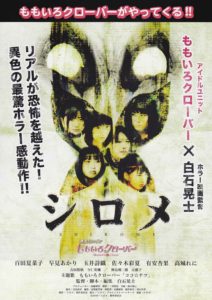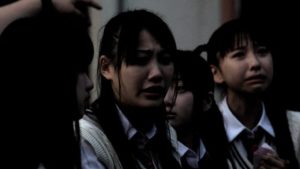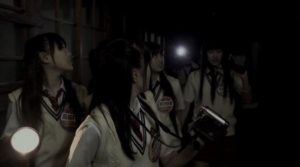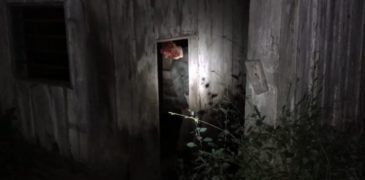
Rumor has it that musicians sell their souls to the devil and worse represent Satan through their songs. It was a ridiculous idea that still scares the bejesus out of anyone who hero-worship such personalities. Then, the idea stretched out through code deciphering videos that took over Youtube ages ago, spurring both negative and positive appeal left and right, including from religious devouts embarking on witch hunts against what they deem ‘earthly’ things. While the recurrent myth among performers is relatively bizarre, Koji Shiraishi, an obvious fancier of mysteries, founded his 2010 found-footage horror on such a premise.

Shirome (2010) might be one of Koji’s most risky pieces of work up to date as he veers from his usual sleuthing and glacial-paced mockumentaries. As far as his filmography goes, he has been reinventing the found footage genre since Noroi: The Curse (2005), guaranteeing his films would not only ride the coattails of his most famous work. He retained his faux-documentary trademark but upped his experimentation with the genre, including unstaged acting and real personalities. He made use of such real-to-life elements to discuss the lengths humans are willing to go to achieve their dreams or justify and overindulge their vanity.
The film follows the story of the real-world Japanese teen idol group “Momoiro Clover” as they agreed on entering and roaming an abandoned building in pursuit of finding the mythical Shirome while holding on to their desire to perform on Kohaku Uta Gassen, a famous television show in Japan aired once a year during New Year’s. Shirome is a local legend known for granting wishes if sincerely asked for. On paper, the premise is nothing but another cliched teenage drama until you find yourself thoroughly distressed by everything happening on-screen. One of the many significant feats of Shiraishi’s found footage film is that he responds well to our anticipation. Although he’s not at his best in this film, with some notable engaging scenes and plot reveal, he managed to deliver a fair amount of moments that do not leave us weary from waiting for any interesting events to occur.
Shiraishi fancies in blurring reality once more, as he starred again as the director himself to helm the supposed program where the teen idol group is featured. His casting of himself is proven effective in his 2009 mockumentary Occult, where he played the same character – a manipulative and complacent director whose amusement comes from compelling his subjects to surpass what’s expected from them, all for the sake of television ratings. While his inclusion was somehow undermined in the former, his appearance in Shirome played a huge role in the plot. With his presence, the inherent navigation of the film on the exploitation of talents in the entertainment industry is much more menacing than all of the paranormal encounters in the film combined.

With the director’s appearance is the starring of the actual members of Momoire Clover. Shiraishi takes it up a notch and records an entire pseudo-television program where the idol group partook. Without the knowledge that they’re shooting a mockumentary of sorts until the filming is wrapped up, what we witness in the film are authentic reactions. In an interview, Reni Takagi, one of the original members of the ensemble, said that there were no acting and lines in the film. On the other hand, only Akari Hayami played along with the filming as she’s the one acquainted with the myth.
Even without this in mind, their reactions are truly bothersome, with their teary-eyed to weeping close-up shots to the unrestrained shrills from one occurrence after another. But, the true horror here is our tendency to take it to extremes to achieve what we desire. Their sheer desperation to perform in a famous national television broadcast had led them to rely solely on the promise that the spirit Shirome would actualize their dream, even if it means sacrificing their sanity. That is probably Shiraishi’s take on the surrounding myth of musicians and artists who assumably sold their souls to the devil for fame. It can also be his interpretation of how absurd J-Pop culture had become in the digital age. Whether a satire or an expose, stardom, as seen in the film, will make you do the most absurd things you could ever imagine, like their final effort to convince Shirome in the ritual room.
The film also has its own cultist makings. What made Noroi and Occult intriguing are the presence of paranormal items, symbolisms, and circumstances that seal the deal for anyone who enters the film expecting these things. Even though Shirome failed to exceed or equal the intensity of their cult elements, there are a few which made the experience fairly eerie. Notably, during their investigation inside the abandoned building, we see evil charms, slimy mucus-like stuff, and weird egg formations scattered in the vicinity. If these are not enough to spook you, the dust-filled personal belongings withering away in the cryptic room are but the only witnesses of the supposed lives taken inside the place.

But the film may disappoint everyone who had seen the director’s earlier films. One of the film’s weakest points comes from its deviation from Shiraishi’s trademark of thoroughly investigating a paranormal anomaly. He appeases us with as much sleuthing as necessary to break the trail for plot twists and the story itself to flourish confidently. Obviously, Shirome doesn’t strive to achieve such elaboration as it only runs for 82 minutes. And yet, it is a blessing, as we don’t have to sit around and endure some half-baked supernatural encounters.
Shiraishi still lacks in the visual department, as the supposed apparitions came out more pathetic than frightening at the least. While his poorly rendered cosmic entities in Occult may be accepted by many as kitschy, the same cannot be said with Shirome‘s. Aside from the scantiness of sightings, we get worked up for nothing when the entities appear on the screen. Also, speaking of its lack of paranormal contact, there are a lot of missed opportunities where they could’ve amped the ghost hunt or the jumpscares. Even during the concert, where it’s unmistakable that its primary concern should be the consequence of the rites on them, we had nothing but a full-length performance that almost made the film a marketing strategy to promote the idol group.
Shirome accumulates its horror from its underlying themes and messages. But its intent is doomed to be overshadowed by its drawbacks. Nevertheless, it does have its moments. One of them that everyone should look forward to is the ghost storyteller, whose presence adds comic relief every time he graces the screen. With that said, it is an experience you could pass up, but a rewarding one for those who want to see Shiraishi experiment on his own found footage filmography.
More Film Reviews
“Witches don’t die before leaving their legacy.” With the Halloween season upon us, it is inherently fitting for us to start thinking about all the wonderful things that have become… With Last Night in Soho, Edgar Wright’s latest film, the British filmmaker continues down the path he’s carved with his 2017 ‘Baby Driver‘ – mixing different genres into an extremely… Things Heard and Seen is an unusual, psychological horror film where several tropes are turned on their heads, while the important beats are still captured. Domestic relationships, power dynamics, and… “My name is Roxy, but the village girls call me toxic” After explaining how womankind found themselves alone in the land known as ‘After Blue’, we meet Roxy whose introduction… Found Footage films have always been a personal favorite sub-genre of mine. Not only does it allow innovation on a budget, but the idea of drastically searching with a camera… The breakdown of friendships into the realm of horror has always been a theme fascinating me; the amount of paranoia needed to turn an object of comfort into terror being…Two Witches (2021) Film Review – You’re in the Dark Now
Last Night In Soho Film Review (2021) – Music, Fashion And Mass-murder
Things Heard and Seen (2021) Film Review – Unique Phycological Horror
After Blue (Dirty Paradise) Film Review – An Erotic, Sci-fi, Coming of Age Tale
Fear Footage 3AM (2021) Film Review – A Frightful Return to Darkbluff
Bleed With Me Film Review – Lets Make A Blood Pact

I am a 4th year Journalism student from the Polytechnic University of the Philipines and an aspiring Filmmaker. I fancy found footage, home invasions, and gore films. Randomly unearthing good films is my third favorite thing in life. The second and first are suspending disbelief and dozing off.





